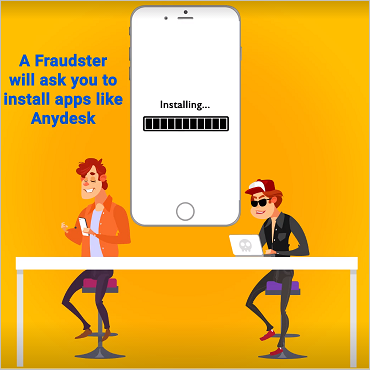Tips to keep your OTP safe from online fraud

In this day and age of internet banking, banking frauds are constantly on the rise. Therefore, it becomes very important to protect your account from such unscrupulous activities. To keep your account safe and secure from unauthorized access and use, banks have now widely implemented the one-time password (OTP) authentication system.
The OTP is a random set of numbers that remains valid only for a specified period of time – and for a single transaction alone. Since OTPs have become a major part of most financial transactions, it is important to keep them protected from unauthorized access and frauds. Let’s take a look at why you should keep your OTP safe and discover some tips that you can use to keep it secure.
Why is it important to keep your OTP safe?
A bank keeps an account protected by allowing only the holder of the OTP to conduct financial transactions. That said, if the OTP were to fall in the hands of someone other than the account holder, it may be misused to conduct unauthorized or illegal financial transactions. That’s why it is important for account holders to safeguard the one-time password received by them.
Tips to keep your OTP safe:
You can protect yourself from falling prey to online frauds and other scams by simply following the below-mentioned tips.
Never share your OTP – The best way to keep your OTP safe is by keeping it a secret. The one-time password that’s received by you should never be shared with anyone. The OTP is highly confidential information, which means that not even the bank’s employees or its customer support team would ever ask you to share it.
Always login through the bank’s official net banking portal – Many online frauds and scams occur through mode, wherein you receive a message stating that your account details need to be verified immediately to prevent deactivation of your bank account. The message would usually include a link that would lead you to a page that might look very similar to your bank’s net banking portal. You may be asked to login using your net banking credentials and the ensuing OTP. This is another way scamsters use to gain access to your OTP and banking information.
A good way to protect yourself from falling for this scam is to always take a look at the URL on the address bar of the web browser. The URLs of these fake bank websites would most likely be different from those of the official portals. You could also check if the website is secure and has a valid certificate of authenticity by clicking on the area of the address bar that’s just beside the URL. Also, always make it a point to access your net banking portal only through the official URL of the bank.
Refrain from downloading suspicious apps – Fraudsters use fake, suspicious, and unscrupulous smartphone apps to steal the OTP from your phone. Never download any application on your smartphone that originates from suspicious sources or unknown third party app developers. This holds true not only for mobile banking apps, but also other everyday apps that you might use on your phone. For instance, scamsters might use an app disguised like a normal calculator app to siphon confidential data off from your phone. Therefore, always ensure that you download apps only from official sources.
Now a days fraudsters call individuals with attractive offers or helping to activate Debit/Credit Cards and request to install certain Apps like Any Desk etc., giving easy and convenient remote access of individual’s mobile phone and/or computer to the fraudulent caller. In this way the fraudulent caller may get OTPs and other KYC information stored in the mobile phone or computer and misuse the same. Hence, do not download any Apps from unknown sources. Learn how these frauds occur and keep yourself safe from them.

Refrain from clicking on suspicious links – If you receive any unsolicited or suspicious links either on your phone via SMS or through an email, you should always refrain from clicking on them. Sometimes, they might be cleverly disguised too. For instance, you might get an SMS or an email that might tell you that you’ve won a lottery or a contest and that you’re required to click on the given link to claim the prize. In such cases, do not click on them, especially if you’ve never entered any such contest. These might be a way to gain access to your phone or your confidential banking information such as your bank account details and OTP.
Contact the bank’s official customer support – Many online frauds trick customers into contacting fake helpline numbers, email IDs, or twitter and facebook profiles pretending to be the bank’s customer support. This way, they trick you into disclosing your OTP and other banking details. And so, when you’re raising any issues related to your banking service, always make sure that you only contact the bank’s official customer support.
Conclusion
One-time passwords are solely for your use and therefore should be guarded. Always be on the lookout for scamsters trying to steal your OTP and other private banking information. Remember, your OTP is valuable and may be misused by fraudsters to steal money from your bank account. RBL Bank values your security and ensures that your sensitive, account-related information is always safe from such online frauds. To ensure that you enjoy a secure banking experience every time you transact with us, we have put together several guidelines and tools that will help prevent fraud. Our mobile banking, internet banking, phone banking, credit and debit cards, and cash and cheque transactions are all equipped with safety measures that make your banking experience smooth and worry-free. To know more about our services, visit www.rblbank.com

 Blog
Blog Blog
Blog



Comments
No comments yet.